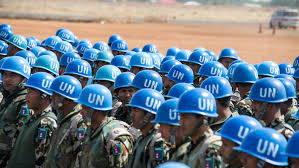United Nations Peacekeeping:

The United Nations peacekeeping chief Jean-Pierre Lacroix is undertaking a visit to India, among the largest troop contributing countries for its operations.
- Jean-Pierre Lacroix will visit India, the United Arab Emirates, Pakistan and Japan starting from October 6.
- He will participate in a two-day meeting organised by the Challenges Forum, the event CAF22, which brings together leading policymakers, practitioners and academics on key issues linked to peace operations.
- The CAF22 will be co-hosted by the organisation’s Indian partner the United Service Institution of India (USI). Under the overarching theme “Future of Peace Operations”.
- India is one of the largest troop and police contributing countries to U.N. peacekeeping missions and more than 5,700 Indian peacekeepers are deployed in nine out of 12 U.N. peacekeeping missions at present.
UN Peacekeeping:
- UN peacekeepers provide security and the political and peacebuilding support to help countries make the difficult, early transition from conflict to peace.
- There are three basic principles that continue to set UN peacekeeping operations apart as a tool for maintaining international peace and security.
- Consent of the parties:
- Non-use of force except in self-defence and defence of the mandate.
- Role of Security Council: The United Nations Charter gives the United Nations Security Council the responsibility to maintain international peace. The Security Council authorize peacekeeping operations through Chapter VII authorizations.
- Financing: As all UN Member States share the costs of peacekeeping, the General Assembly apportions these expenses based on a special scale of assessments, taking into account the relative economic wealth of Member States, with the permanent members of the Security Council required to pay a larger share.
- Consent of the parties:
- For its services, UN Peacekeeping has also received the Nobel Peace Prize.
- UN peacekeepers are often referred to as Blue Berets or Blue Helmets because of their light blue berets or helmets.




